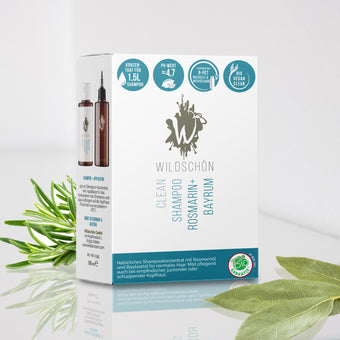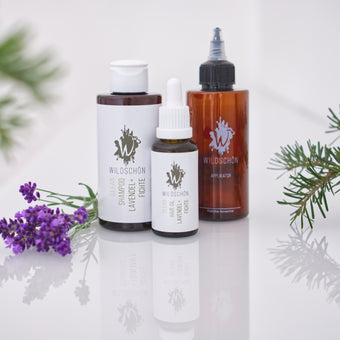Natural shampoo also for your husband or your child? No problem!
- Conventional shampoos often contain bitter substances that deter children from swallowing products with potentially harmful ingredients.
- Care products for the youngest and the little ones should be particularly gentle and well tolerated: they are free of dyes, silicones, parabens and mineral oils.
- The skin of women and men does not differ so much that special shampoos are necessary. But the care habits are often different.
Which mother does not know this: In the supermarket, the children do not necessarily reach for the sensible products, but mostly for those with unicorns, princesses, superheroes or police dogs on the packaging. And when there is glitter in the shampoo, the female midgets in particular are unstoppable - despite all attempts to raise them without gender clichés. And grown-up men are more likely to be impressed by the robust, distinctive look of the packaging instead of taking a detailed look at the list of contents. Easy game for manufacturers and their product concepts. But you know better what's good for your loved ones! Even if it can be a bit difficult to guide the youngsters past the colorful products or the better half past the dark blue products: It's worth it.
When is a product actually suitable for children?
There is actually no concrete definition of what constitutes a children's shampoo. Apart from the packaging, it is usually important to children that the hair care product does not sting their eyes, that it smells nice and foams and that it does not tug when you comb it afterwards. On the other hand, it is probably more important to you that it does not contain any harmful ingredients or unnecessary chemicals, such as synthetic fragrances, glycerin, diethyl phthalate or formaldehyde. The manufacturers know this and at least make sure to comply with the legally prescribed maximum quantities. Because many children's shampoos still contain ingredients that are potentially harmful if swallowed, unnecessary bitter substances are added, recognizable in the declaration as denatonium benzoate, for example. It's the most bitter substance known, making the stuff so gross that the dwarfs never even bother to take a sip from the shampoo bottle. Manufacturers of conventional shampoos like to use denatonium benzoate because it also has a preservative effect. Numerous shampoos - including those for children or men - can also pollute the environment, because they often contain polyethylene glycol (PEG) or PEG derivatives. These surfactants are used as cleaning substances or create a lot of foam. Of course the kids like that. But they may also make the skin more permeable to pollutants. At the same time, many shampoos contain synthetic polymers that are considered potentially harmful to the environment.
Do you need a special children's shampoo for children?
You may have already read in guides that children's skin and hair have very special needs. Intuitively, that seems to be true: children's hair is finer than that of adults, and the skin of little princesses and princes is softer and more sensitive than ours. Care products for the little ones and little ones should therefore be particularly gentle and well tolerated. You can already see that when you take a look at the advertising for the specialized products: they are free of dyes, silicones, parabens and mineral oils. They contain particularly mild surfactants as washing substances, which are nevertheless absolutely able to remove dirt and grease. Does this listing remind you of anything? I agree! Of course, the same rules also apply to natural shampoos – and even stricter ones that we impose on ourselves. You should still be careful with very small children: since our shampoo concentrates contain small amounts of natural essential oils, we do not recommend them for babies and small children under the age of three to be on the safe side. In the amounts used, the oils are basically harmless, especially in the specified dilution. Nevertheless, the oils are quite potent ingredients - which is why we use them. Basically, of course, the following applies: Smaller children in particular should not have free access to shampoos or other cleaning substances.
Do men need special care because of their hair and skin structure?
Before we keep you in suspense: There are no mysterious differences in men's hair or scalp that would make it necessary to use a special shampoo. The only differences in many cases are hair length and washing habits. Women who often wear longer hair do not usually wash it as often, while men tend to wash it every day. Otherwise: hair structure, growth phases, the need for nutrients etc. - here you will not find any relevant differences between him and her. You can see this when you look at the ingredients of typical male shampoos: some contain fewer softeners and smootheners, and the added fragrances are more tart or fresh than floral, but they basically work in the same way. Many men who switch to natural shampoo also appreciate the restrained scent, because not everyone likes the sharp scent of typically male provenance, which often reminds us of a mixture of toilet stone and chewing gum.
Natural shampoo is suitable for the whole family
Naturhampoos are designed to supply the hair and scalp with important nutrients and to restore the self-healing powers and natural regulation of skin and hair. That's actually a nice message: We were all born with beautiful hair and skin that is wonderfully self-regulating as long as it's healthy - regardless of age or gender. With the same ideas and approaches, you can ensure your family has a healthy scalp and beautiful hair; no marketing ideas from the cosmetics industry are needed for this. Naturally, shampoos with natural ingredients are therefore also suitable for children and men. Basically, you only need one shampoo at home. And if that's a problem with the glitter princesses and rainbow unicorns, here's a professional tip from our personal experience: a glitter sticker on the applicator or concentrate bottle is sometimes enough. Only the gentleman in the house might have to push himself a little harder - but he'll definitely be happy to do it for the offspring.








